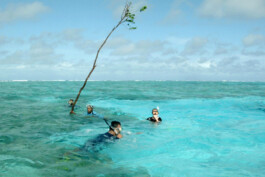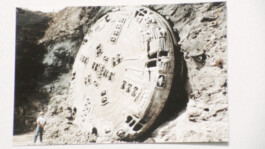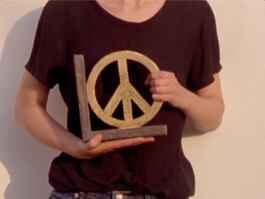selected works
Earth Proxy
HD Video, Farbe, Ton
25 Minuten,
Fidschi Inseln 2024

In an attempt to document the climate change-induced transformations of Fiji’s cultural geographies, filmmaker and photographer Lisa Rave was invited to participate in an inventory process through auto-ethnographic cultural mapping across various villages and communities in and around Viti Levu, Fiji. Central to this work was the camera—as both a tool for documentation and a medium for expression and experimentation.
In association with the research project Climate Crisis Cultural Loss led by curator Ute Meta Bauer
Push to Pull – Study of a Monument
3 photographs C-Print 60x40 cm
Video loop
2024







Push to Pull - Study of a Monument is an attempt to make sense of a monument now in neglect and its relationship to the European struggle for identity and cohesion at a moment where the union is heading towards isolation and a toughened stance towards migration. At the entrance to the former refugee camp Kara Tepe on the island of Lesbos stands the abandoned sculpture titled Solidarity, commissioned in 2015 by the city from a local sculptor. Lesbos — internationally known for overcrowded camps like Moria and Kara Tepe — remains a central site of European migration policy, shaped by systematic yet scarcely documented pushbacks in which asylum seekers are violently forced back into the Aegean Sea. At the same time, humanitarian aid is increasingly criminalized, framed as a supposed pull factor.
The film positions itself as a fictional prefiguration — a study of a monument that anticipates its potential future existence, while critically reflecting on a culture of remembrance overshadowed by ongoing humanitarian crises.
In association with Fieldrecording on Lesbos - Experimenting with affective methods between art and anthropology
Erasmus+ Blended Intensive Programme Akademie der Bildenden Künste Nürnberg, organized by Angela Stiegler and Isabel Bredenbröker,
We Are Ocean
HD video, color, sound
16 minutes
2019









We Are Ocean Filmstill
Intervention at MarineRegionsForum
We Are Ocean Filmstill
We Are Ocean Filmstill
We Are Ocean Filmstill
We Are Ocean Filmstill
We Are Ocean Filmstill
We Are Ocean Filmstill
We Are Ocean Filmstill
Emerging out of a workshop held together with the Research Institute of Sustainability (RIFFS), the filmmaker and school students in Berlin, this collaborative film centeres around the pressing ecological and sociopolitical impacts of climate change. The fractured nature of the film reflects their hopes, fears, and aspirations as they navigate themselves in the complexities of the current. The film shoot took place in their class rooms, utiliziing a bluescreen to situate, project and escape. Each scene was scripted by the teenagers themselves.
In collaboration with
Barbara-Zürner-Oberschule Velten and Schule am Berlinickeplatz Berlin
Camera and Sound: Andreas Bolm
Editing: Andreas Bolm, Lisa Rave
Comissioned by: ARTPORT_making waves and UNESCO
Produced by: Anne Marie Melster and Julia Moritz
In association with the Research Institute for Sustainability Helmholtz Centre Potsdam (RIFS)
As a contribution to the United Nations Decade of the Ocean Science for Sustainable Development
Taboo Ceremony
HD Video, color, sound
20 minutes
30 photographs, official documents. wooden table and glas cover 200 x 80 cm
2017


Tambu / Tapu / Taboo Exhibition View The Oceanic CCA Singapore
30 photographs, some turned to their back, permit document by the ministry of iTaukei Affairs Fiji, wooden table, glas cover 200 x 80 cm.
In collaboration with the anthropologist Guigone Camus 2017
Tabu Ceremony Filmstill
A Tabu in Fiji traditionally defines a thing or place as sacred and prohibits any human interference once it is installed. The film takes witness in the ceremonial practice of establishing the first Tabu in the open ocean following a unique ritual. Men from Vanua Vatu island are joined during the traditional practice by the art organization TBA21 Academy. The film follows the diverse group during this unprecedented event.
The installation within the exhibition The Oceanic at CCA Singapore also consisted of a table of additional documents and images, some turned to their back.
In collaboration with anthropologist Guigone Camus
Produced by NTU Centre for Contemporary Art Singapore
and TBA21 Academy
AMERICIUM
HD Video, color, sound
40 minutes
Carpet and window foiling
2017
HD Video, color, sound
40 minutes
Carpet and window foiling
2017













Americium Filmstill ©LisaRave
AMERICIUM Installation Glasmoog
AMERICIUM Installation Glasmoog
Americium Filmstill ©LisaRave
Americium Filmstill ©LisaRave
Americium Filmstill ©LisaRave
Americium Filmstill ©LisaRave
Americium Filmstill ©LisaRave
Americium Filmstill ©LisaRave
Americium Filmstill ©LisaRave
Research material Workers complete drilling of the five-mile long, horseshoe-shaped exploratory tunnel through Yucca Mountain at the proposed high-level nuclear waste repository in Nevada. US Department of Energy 1997 © Yucca Mountain Science Center Pahrump
Research material Nevada Test Site (NTS), 65 miles north of Las Vegas. Nuclear testing, both atmospheric and underground, occurred between 1951 and 1992. © Yucca Mountain Science Center Pahrump
Research material Decontamination Practice © Yucca Mountain Science Center Pahrump
Taking its title from a man made radioactive element, AMERICIUM addresses the literal contamination of sacred lands and the spiritual neglect of an American landscape. The film revolves around the contested long term nuclear storage facility of Yucca Mountain using portraits of individuals and local communities to explore the conflicting ideologies and fantasies of the American West. It is a search for what is invisible and embedded within the landscape, a meditation on what is simultaneously real and imagined. Most filming material had been produced just prior to the November 2016 Presidential election.
The installation at Glasmoog Cologne in 2017 included window foiling that resembled a casino design, effectively blocking the view into the interior of the space.
In collaboration with Erik Blinderman
Music: Floating Cult by John Butcher
Image and Sound: Erik Blinderman and Lisa Rave
Sound Design: Christian Obermaier
Sound Mixing: Ralf Schipke / Kunsthochschule für Medien Köln
With kind support by the Akademie Schloss Solitude, Kunsthochschule für Medien Köln (KHM)
and Tabakalera International Centre for Contemporary Culture San Sebastian
Produced by Whole Wall Films
Bar del Ponte – a trailer
16 mm transferred to HD, HD Video, color, sound
4 minutes
2015




Bar del Ponte Filmstill ©LisaRave
Bar del Ponte Filmstill ©LisaRave
Bar del Ponte Filmstill ©LisaRave
Bar del Ponte Filmstill ©LisaRave
Located in the heart of the Italian city Albenga, Bar del Ponte which translates to Bar on the Bridge, served as a vital social gathering place for refugees faced with numerous obstacles on their path to integration. Run by a compassionate Moroccan, it provided a safe haven for individuals fleeing war, persecution, and hardship. Within its walls, people from different backgrounds, cultures, and experiences found solace and companionship. What began as a semi-fictional film inspired by their stories gradually transformed into a short documentary about the process of making that very film. However, shortly after the initial shoot, the municipality shut the bar down. As a result, the early footage now remains a trailer.
In collaboration with Erik Blinderman
Image and Sound: Erik Blinderman and Lisa Rave
Produced by Whole Wall Films
Burning–in Patterns
16mm transferred to HD Video, color, sound
25 minutes
2015




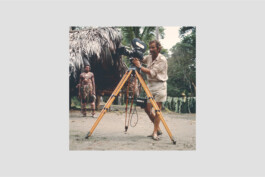


Ancestral Figure, © Lisa Rave 2015, C-type Print 36 cm x 52 cm
Ausstellungsansicht Akademie Schloss Solitude Stuttgart 2015
Burning in patterns Filmstill ©LisaRave
Burning in patterns Filmstill ©LisaRave
Research material Hermann Schlenker Papua, New Guinea © Hermann Schlenker
Research material Hermann Schlenker, Venezuela © Hermann Schlenker
Hermann Schlenker, Papua, New Guinea © Hermann Schlenker
Between the 1960s and 1980s the German ethnographer completed more than 400 ethnographic films of indigenous communities around the world, studying and documenting their cultures, societies, and behaviors for renowned institutions such as the Encyclopaedia Cinematographica (EC) as well as various museums worldwide. By using the same techniques he himself used to create his ethnographic films, the resulting film examines the many ambiguities of ethnographic fieldwork, institutional archiving and the conservation of memory. The film oscillates between objectification and subjective accounts that weave into the films fabric. Through playing with the gaps of montage, the juxtaposition of image, text and sound the film’s shifting narrative moves between filmic document, recounted memory and the act of staging.
In collaboration with Anna Vetter
Camera: Jürgen Haller
Sound: Jürgen Haller, Anna Vetter
Montage: Lisa Rave
Sound editing: Tobias Bilz
Color grading: wave-line GmbH Berlin
16mm transfer: Reiner Meyer, Kornmanufaktur, Berlin
Produced by Whole Wall Films
With kind support by:
Künstlerinnen Programm des Berliner Senats
Akademie Schloss Solitude
EUROPIUM
HD Video, color, sound
21 minutes
2014











EUROPIUM Haus der Kulturen der Welt, 2018 Ausstellungsansicht Transmediale,Territories of Complicity Photo©Luca-Girardini
EUROPIUM Kunstmuseum Basel 2019 Ausstellungsansicht Circular Flow.On The Inequality of Economy, Kunstmuseum Basel
Curved Flatscreen 50 Zoll, curved carpet, 2 white leather seats, 4 drawings by Paul Gauguin of the collection Kunstmuseum Basel
EUROPIUM Vitrine Museumsvitrine 180 cm x 40 cm, fluoreszierendes Licht Muschelgeld aus der Sammlung des Hessischen Landesmuseums mit Beschriftungen Archiv Handschuhe, Fotografien aus dem Bestandsarchivn Ausstellungsansicht Vitrine Ozeanische Gefühle Hessisches Landesmuseum Darmstadt 2018
Europium, Hessisches Landesmuseum Darmstadt, 2019 Ausstellungsansicht Vitrine Ozeanische Gefühle, Hessisches Landesmuseum Darmstadt, 2019 Museumsvitrine 180 cm x 40 cm, fluoreszierendes Licht, Muschelgeld aus der Sammlung des Hessischen Landesmuseums, Archivkarte, Handschuhe
EUROPIUM Filmstill ©LisaRave
EUROPIUM Filmstill ©LisaRave
EUROPIUM Filmstill ©LisaRave
EUROPIUM Filmstill ©LisaRave
EUROPIUM Filmstill ©LisaRave
Research material Missionary Heinrich Zahn with the Conch Shell Choir 1930, Hocpoi Papua New Guinea © Mission EineWelt Neudendettelsau
Research material The Conchshell Choir Neuendettelsau 1979 © Mission EineWelt Neudendettelsau
Using various levels of imagery, the essay film Europium draws connections between Papua New Guinea's colonial past and the planned excavation of raw materials from the Bismarck Sea. The film weaves a narrative around the rare earth element Europium; named after the European continent, the material will be culled from the ocean floor to ensure brilliant color images on smartphone displays and other flat screens, and of course for its fluorescent property, which is used to guarantee the authenticity of euro bank notes. The film describes this seemingly mundane fact as a return and repetition of history, pointing in the process not only to the complexity of human culture, its economies and systems of exchange, but also exposing the invisible ghosts of the past as they appear in the modern objects of our lives. -Philipp Kleinmichel
A film by Lisa Rave
Voiceover: Hanne Lippard
Written by Lisa Rave, co-writer and editor: Erik Blinderman
Assistance: Anna Vetter
1st camera: Nicola Hens
2nd camera: Erik Blinderman
Camera Operator: Moritz Fehr
Sound editing: Christian Obermaier
Color grading: Moritz Fehr
Produced by Whole Wall Films
Production funded by:
Filmförderung Hamburg Schleswig-Holstein
Stiftung Kunstfonds Bonn
Videokunst Förderpreis BremenAkademie Schloss Solitude
Additional links and publications:
Vdrome
Mousse Magazine
TAZ
Transmediale
The Villages
16mm transferred to HD Video, color, sound
30 minutes
2011
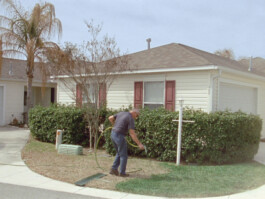



The Villages Filmstill
The Villages Filmstill
The Villages Filmstill
The Villages Filmstill
The Villages is a documentary film, presenting two geographically distinct communities as they begin to merge into one fictive filmed space. The film moves from intimacy to observation, focusing on a retirement community of the same name and the former German colonial town of Swakopmund, Namibia, most recently appearing as the setting for the remake of the British television series, The Prisoner. Using the series as a leitmotif, The Villages portrays the reconstruction and the idealization of colonial histories, through the architecture, borders and social relations of both communities. A narrative begins to form between the analogies of spaces and the conventions of documentary, between the synchronization of image and sound; between acting and editing. The Villages represents a fantastic dystopian space, through the ever-evolving social segregation of the communities and the transformation of tourism into everyday life. - Jakob Schillinger
In collaboration with Erik Blinderman
Image and Sound: Erik Blinderman, Lisa Rave
Editing: Lisa Rave
Sound editing and mixing: Christian Obermaier
Colorist: Antonia Gogin / Venim Berlin
With kind support by:
Filmförderung Hamburg Schleswig-Holstein
Elsa-Neumann-Stipendium Berlin
Venim Berlin
We are Stardust
16 mm film transferred to HD Video
Nagra analogue sound
digital transfer

We Are Stardust Filmstill
We are Stardust We are Golden and We´ve got to get Ourselves back to the Garden, whose title is taken from a verse of Joni Mitchell's song "Woodstock," returns to the place where the legendary festival of the same name took place in 1969. Exactly forty years later, the archaic 16mm film camera and analogue sound document the now privatized grounds patrolled by the police, capturing the surveillance as well as the commodification of "counterculture" at the newly opened museum.
Camera: Fern Silva
Sound: David Horvitz
With kind support by Bard College, New York
shows
bio +
additional work
Screenings / Exhibitions (selected)
2025
Where the Landscape Ends film festival at With the Rubbles of Old Palaces
Relate / Recover Tiapapata Art Center, Samoa
2024
The Ecologies of Peace Centro de Creación Contemporánea de Andalucía
Climate Crisis and Cultural Loss ADM Gallery, Singapore
Climate Crisis and Cultural Loss Ocean Space Venice
Real Abstraction Temples Los Angeles
The Shadow of the Wall is like Iron basis Frankfurt
Man & Mining Museum der Arbeit Hamburg
2023
Mining Photography. Gewerbemuseum Winterthur
Mining Photography. Kunsthaus Wien
Copenhagen Architecture Festival
Counter Flows Bathala Cinema Center Porto
2022
Climate of Concern RADIUS Center for Contemporary Art and Ecology
17th Istanbul Biennial Film Programme
Fragt die Steine, Werkleitz Festival, Halle
TERRITO/REALITIES, Art Photography Center, Singapore
Takeover Gropius Bau Berlin
Mining Photography Kunst und Gewerbe Museum Hamburg
2021
Chennai Photo Biennale
Estudiotik at. Tabakalera, San Sebastian
Critical Ecology on film Mishkin Gallery New York
Hybrid - New Nature Hellerau, Europäisches Zentrum der Künste, Dresden
2020
The Sea is Glowing, Rijeka 2020
2019
The Drowned World, Toronto Biennale
Symptom Bauhaus, West Den Haag
Ghosts in the Gardens of Progress, Videonale.Scope#7
Circular Flow, Kunstmuseum Basel
Third from the Sun. Views and Prospects of the Anthropocene screening,
Museum of Modern Art Vienna (mumok)
2018
The Cracks not the Mirror, Videonale.scope#6 Cologne
Holen und Bringen, Werkleitz Festival Halle
Tangible Remains. Hidden Matters, Decad Berlin
Oceans. Imagining a tidalectic worldview, Museum of Modern Art Dubrovnik
Ray Festival, Fotografie Forum Frankfurt
Somewhere in Between, BOZAR Brussels
Reassembling the Natural, Tieranatomisches Theater Berlin
Face/Value, transmediale, Haus der Kulturen der Welt Berlin
2017
The Oceanic, Centre for Contemporary Art Singapore
I Taste the Future,Lofoten International Art Festival (LIAF)
Americium, Glasmoog Cologne
Sekula beyond Sekula, TBA21-Augarten
Are we Human? 3. Istanbul Design Biennale
2016
A hole in the Sea, Württembergischer Kunstverein Stuttgart
Race to the Bottom group show, Schloß Ringenberg
Dear Betty: Run Fast, Bite Hard! Galleria d'Arte Moderna e Contemporanea di Bergamo
2015
Winter Event – antifreeze, Flora ars+natura Bogota
2014
Kinoproba screening, International Film Festival Jekatarinburg
21. Video Art Award Bremen, Künstlerhaus Bremen
2012
An_Eignungen group show, Kunstverein Langenhagen
Keeping up Appearances, Nassauischer Kunstverein
Young Curators, New Ideas IV, Meulensteen Gallery New York
FIDMarseille screening, Film Festival Marseille
2011
21st CENTURY screening, Chisenhale Gallery London
based in berlin
Education
2008
MFA Photography Bard College, New York
2007
Experimental Film and Visual Communication,
University of the Arts Berlin Diploma
2005
Semester abroad California College of the Arts San Francisco
Semester abroad The Royal Academy of Fine Arts, Copenhagen
2001
European Film College, Denmark - Diploma
Fellowships / Grants / Awards
2025
Climate Action Artist Residency, Samoa, Foreign Office Germany
2024
Research Grant Berliner Senat
2023
Research Fellow Climate Crisis and Cultural Loss
led by curator Ute Meta Bauer, Technichal University Singapore
2022
Artist in residence, Goethe Institute Singapore
2020
Artist in residence, Art Hub Copenhagen
2017
Fellowship 'The Current' Thyssen Bornemisza
Art Contemporary Academy TBA21 Academy
2016
Artist Fellowship Kunsthochschule für Medien Köln (KHM)
2015
Film/Video residency at TABAKALERA San Sebastian
Artist Residency Bosch Research Campus
Artists film/video work stipend Berlin Senate of Cultural Affairs
2014
Film/Video fellowship, Akademie Schloss Solitude Stuttgart
2012
21. Bremen Video Art Award
2010
Postgraduate Working Grant Elsa-Neumann-Stipend Berlin
Other Work (selection)
2023
Climate Crisis and Cultural Loss Conference NTU Singapore
2019
We Are Ocean Workshop commissioned by ARTPORT_Making Waves
in collaboration with UNESCO and RIFS Potsdam
2018 - 23
Program coordinator Academy of Fine Arts Nuremberg LEONARDO
2019
Panelist Marine Region Forum Berlin
Filmic Practices within Autochthonous Struggles La Femis Paris
Views and Prospects of the Anthropocene mumok Wien
Life with Water Participant Art Hub Copenhagen
2018
Extracting (Hi)stories of Complicity Panelist transmediale HKW Berlin
Who owns the Ocean? Panelist Centre for Contemporary Art Singapore
2017
The Henningsvær Charter Art Academy and NTNU Trondheim
Art of Movement cinematography, documentary by Boglárka Börcsök
Guest Lecturer Academy of Fine Arts, Dresden
Guest Lecturer Berlin Weißensee School of Art
2014
Laugther at Work, The Politics of Humor in Film conference
Akademie Schloss Solitude Stuttgart
Chronicles of Work V: The Dissensual Awareness of Labor Panelist
Akademie Schloss Solitude
selected works

EUROPIUM
Earth Proxy
HD Video, Farbe, Ton
25 Minuten,
Fidschi Inseln 2024

In an attempt to document the climate change-induced transformations of Fiji’s cultural geographies, filmmaker and photographer Lisa Rave was invited to participate in an inventory process through auto-ethnographic cultural mapping across various villages and communities in and around Viti Levu, Fiji. Central to this work was the camera—as both a tool for documentation and a medium for expression and experimentation.
In association with the research project Climate Crisis Cultural Loss led by curator Ute Meta Bauer
Push to Pull – Study of a Monument
3 photographs C-Print 60x40 cm
Video loop
2024







Push to Pull - Study of a Monument is an attempt to make sense of a monument now in neglect and its relationship to the European struggle for identity and cohesion at a moment where the union is heading towards isolation and a toughened stance towards migration. At the entrance to the former refugee camp Kara Tepe on the island of Lesbos stands the abandoned sculpture titled Solidarity, commissioned in 2015 by the city from a local sculptor. Lesbos — internationally known for overcrowded camps like Moria and Kara Tepe — remains a central site of European migration policy, shaped by systematic yet scarcely documented pushbacks in which asylum seekers are violently forced back into the Aegean Sea. At the same time, humanitarian aid is increasingly criminalized, framed as a supposed pull factor.
The film positions itself as a fictional prefiguration — a study of a monument that anticipates its potential future existence, while critically reflecting on a culture of remembrance overshadowed by ongoing humanitarian crises.
In association with Fieldrecording on Lesbos - Experimenting with affective methods between art and anthropology
Erasmus+ Blended Intensive Programme Akademie der Bildenden Künste Nürnberg, organized by Angela Stiegler and Isabel Bredenbröker,
We Are Ocean
HD video, color, sound
16 minutes
2019









We Are Ocean Filmstill
Intervention at MarineRegionsForum
We Are Ocean Filmstill
We Are Ocean Filmstill
We Are Ocean Filmstill
We Are Ocean Filmstill
We Are Ocean Filmstill
We Are Ocean Filmstill
We Are Ocean Filmstill
Emerging out of a workshop held together with the Research Institute of Sustainability (RIFFS), the filmmaker and school students in Berlin, this collaborative film centeres around the pressing ecological and sociopolitical impacts of climate change. The fractured nature of the film reflects their hopes, fears, and aspirations as they navigate themselves in the complexities of the current. The film shoot took place in their class rooms, utiliziing a bluescreen to situate, project and escape. Each scene was scripted by the teenagers themselves.
In collaboration with
Barbara-Zürner-Oberschule Velten and Schule am Berlinickeplatz Berlin
Camera and Sound: Andreas Bolm
Editing: Andreas Bolm, Lisa Rave
Comissioned by: ARTPORT_making waves and UNESCO
Produced by: Anne Marie Melster and Julia Moritz
In association with the Research Institute for Sustainability Helmholtz Centre Potsdam (RIFS)
As a contribution to the United Nations Decade of the Ocean Science for Sustainable Development
Taboo Ceremony
HD Video, color, sound
20 minutes
30 photographs, official documents. wooden table and glas cover 200 x 80 cm
2017


Tambu / Tapu / Taboo Exhibition View The Oceanic CCA Singapore
30 photographs, some turned to their back, permit document by the ministry of iTaukei Affairs Fiji, wooden table, glas cover 200 x 80 cm.
In collaboration with the anthropologist Guigone Camus 2017
Tabu Ceremony Filmstill
A Tabu in Fiji traditionally defines a thing or place as sacred and prohibits any human interference once it is installed. The film takes witness in the ceremonial practice of establishing the first Tabu in the open ocean following a unique ritual. Men from Vanua Vatu island are joined during the traditional practice by the art organization TBA21 Academy. The film follows the diverse group during this unprecedented event.
The installation within the exhibition The Oceanic at CCA Singapore also consisted of a table of additional documents and images, some turned to their back.
In collaboration with anthropologist Guigone Camus
Produced by NTU Centre for Contemporary Art Singapore
and TBA21 Academy
AMERICIUM
HD Video, color, sound
40 minutes
Carpet and window foiling
2017













Americium Filmstill ©LisaRave
AMERICIUM Installation Glasmoog
AMERICIUM Installation Glasmoog
Americium Filmstill ©LisaRave
Americium Filmstill ©LisaRave
Americium Filmstill ©LisaRave
Americium Filmstill ©LisaRave
Americium Filmstill ©LisaRave
Americium Filmstill ©LisaRave
Americium Filmstill ©LisaRave
Research material Workers complete drilling of the five-mile long, horseshoe-shaped exploratory tunnel through Yucca Mountain at the proposed high-level nuclear waste repository in Nevada. US Department of Energy 1997 © Yucca Mountain Science Center Pahrump
Research material Nevada Test Site (NTS), 65 miles north of Las Vegas. Nuclear testing, both atmospheric and underground, occurred between 1951 and 1992. © Yucca Mountain Science Center Pahrump
Research material Decontamination Practice © Yucca Mountain Science Center Pahrump
Taking its title from a man made radioactive element, AMERICIUM addresses the literal contamination of sacred lands and the spiritual neglect of an American landscape. The film revolves around the contested long term nuclear storage facility of Yucca Mountain using portraits of individuals and local communities to explore the conflicting ideologies and fantasies of the American West. It is a search for what is invisible and embedded within the landscape, a meditation on what is simultaneously real and imagined. Most filming material had been produced just prior to the November 2016 Presidential election.
The installation at Glasmoog Cologne in 2017 included window foiling that resembled a casino design, effectively blocking the view into the interior of the space.
In collaboration with Erik Blinderman
Music: Floating Cult by John Butcher
Image and Sound: Erik Blinderman and Lisa Rave
Sound Design: Christian Obermaier
Sound Mixing: Ralf Schipke / Kunsthochschule für Medien Köln
With kind support by the Akademie Schloss Solitude, Kunsthochschule für Medien Köln (KHM)
and Tabakalera International Centre for Contemporary Culture San Sebastian
Produced by Whole Wall Films
Bar del Ponte – a trailer
16 mm transferred to HD, HD Video, color, sound
4 minutes
2015




Bar del Ponte Filmstill ©LisaRave
Bar del Ponte Filmstill ©LisaRave
Bar del Ponte Filmstill ©LisaRave
Bar del Ponte Filmstill ©LisaRave
Located in the heart of the Italian city Albenga, Bar del Ponte which translates to Bar on the Bridge, served as a vital social gathering place for refugees faced with numerous obstacles on their path to integration. Run by a compassionate Moroccan, it provided a safe haven for individuals fleeing war, persecution, and hardship. Within its walls, people from different backgrounds, cultures, and experiences found solace and companionship. What began as a semi-fictional film inspired by their stories gradually transformed into a short documentary about the process of making that very film. However, shortly after the initial shoot, the municipality shut the bar down. As a result, the early footage now remains a trailer.
In collaboration with Erik Blinderman
Image and Sound: Erik Blinderman and Lisa Rave
Produced by Whole Wall Films
Burning–in Patterns
16mm transferred to HD Video, color, sound
25 minutes
2015







Ancestral Figure, © Lisa Rave 2015, C-type Print 36 cm x 52 cm
Ausstellungsansicht Akademie Schloss Solitude Stuttgart 2015
Burning in patterns Filmstill ©LisaRave
Burning in patterns Filmstill ©LisaRave
Research material Hermann Schlenker Papua, New Guinea © Hermann Schlenker
Research material Hermann Schlenker, Venezuela © Hermann Schlenker
Hermann Schlenker, Papua, New Guinea © Hermann Schlenker
Between the 1960s and 1980s the German ethnographer completed more than 400 ethnographic films of indigenous communities around the world, studying and documenting their cultures, societies, and behaviors for renowned institutions such as the Encyclopaedia Cinematographica (EC) as well as various museums worldwide. By using the same techniques he himself used to create his ethnographic films, the resulting film examines the many ambiguities of ethnographic fieldwork, institutional archiving and the conservation of memory. The film oscillates between objectification and subjective accounts that weave into the films fabric. Through playing with the gaps of montage, the juxtaposition of image, text and sound the film’s shifting narrative moves between filmic document, recounted memory and the act of staging.
In collaboration with Anna Vetter
Camera: Jürgen Haller
Sound: Jürgen Haller, Anna Vetter
Montage: Lisa Rave
Sound editing: Tobias Bilz
Color grading: wave-line GmbH Berlin
16mm transfer: Reiner Meyer, Kornmanufaktur, Berlin
Produced by Whole Wall Films
With kind support by:
Künstlerinnen Programm des Berliner Senats
Akademie Schloss Solitude
EUROPIUM
HD Video, color, sound
21 minutes
2014











EUROPIUM Haus der Kulturen der Welt, 2018 Ausstellungsansicht Transmediale,Territories of Complicity Photo©Luca-Girardini
EUROPIUM Kunstmuseum Basel 2019 Ausstellungsansicht Circular Flow.On The Inequality of Economy, Kunstmuseum Basel
Curved Flatscreen 50 Zoll, curved carpet, 2 white leather seats, 4 drawings by Paul Gauguin of the collection Kunstmuseum Basel
EUROPIUM Vitrine Museumsvitrine 180 cm x 40 cm, fluoreszierendes Licht Muschelgeld aus der Sammlung des Hessischen Landesmuseums mit Beschriftungen Archiv Handschuhe, Fotografien aus dem Bestandsarchivn Ausstellungsansicht Vitrine Ozeanische Gefühle Hessisches Landesmuseum Darmstadt 2018
Europium, Hessisches Landesmuseum Darmstadt, 2019 Ausstellungsansicht Vitrine Ozeanische Gefühle, Hessisches Landesmuseum Darmstadt, 2019 Museumsvitrine 180 cm x 40 cm, fluoreszierendes Licht, Muschelgeld aus der Sammlung des Hessischen Landesmuseums, Archivkarte, Handschuhe
EUROPIUM Filmstill ©LisaRave
EUROPIUM Filmstill ©LisaRave
EUROPIUM Filmstill ©LisaRave
EUROPIUM Filmstill ©LisaRave
EUROPIUM Filmstill ©LisaRave
Research material Missionary Heinrich Zahn with the Conch Shell Choir 1930, Hocpoi Papua New Guinea © Mission EineWelt Neudendettelsau
Research material The Conchshell Choir Neuendettelsau 1979 © Mission EineWelt Neudendettelsau
Using various levels of imagery, the essay film Europium draws connections between Papua New Guinea's colonial past and the planned excavation of raw materials from the Bismarck Sea. The film weaves a narrative around the rare earth element Europium; named after the European continent, the material will be culled from the ocean floor to ensure brilliant color images on smartphone displays and other flat screens, and of course for its fluorescent property, which is used to guarantee the authenticity of euro bank notes. The film describes this seemingly mundane fact as a return and repetition of history, pointing in the process not only to the complexity of human culture, its economies and systems of exchange, but also exposing the invisible ghosts of the past as they appear in the modern objects of our lives. -Philipp Kleinmichel
A film by Lisa Rave
Voiceover: Hanne Lippard
Written by Lisa Rave, co-writer and editor: Erik Blinderman
Assistance: Anna Vetter
1st camera: Nicola Hens
2nd camera: Erik Blinderman
Camera Operator: Moritz Fehr
Sound editing: Christian Obermaier
Color grading: Moritz Fehr
Produced by Whole Wall Films
Production funded by:
Filmförderung Hamburg Schleswig-Holstein
Stiftung Kunstfonds Bonn
Videokunst Förderpreis BremenAkademie Schloss Solitude
Additional links and publications:
Vdrome
Mousse Magazine
TAZ
Transmediale
The Villages
16mm transferred to HD Video, color, sound
30 minutes
2011




The Villages Filmstill
The Villages Filmstill
The Villages Filmstill
The Villages Filmstill
The Villages is a documentary film, presenting two geographically distinct communities as they begin to merge into one fictive filmed space. The film moves from intimacy to observation, focusing on a retirement community of the same name and the former German colonial town of Swakopmund, Namibia, most recently appearing as the setting for the remake of the British television series, The Prisoner. Using the series as a leitmotif, The Villages portrays the reconstruction and the idealization of colonial histories, through the architecture, borders and social relations of both communities. A narrative begins to form between the analogies of spaces and the conventions of documentary, between the synchronization of image and sound; between acting and editing. The Villages represents a fantastic dystopian space, through the ever-evolving social segregation of the communities and the transformation of tourism into everyday life. - Jakob Schillinger
In collaboration with Erik Blinderman
Image and Sound: Erik Blinderman, Lisa Rave
Editing: Lisa Rave
Sound editing and mixing: Christian Obermaier
Colorist: Antonia Gogin / Venim Berlin
With kind support by:
Filmförderung Hamburg Schleswig-Holstein
Elsa-Neumann-Stipendium Berlin
Venim Berlin
We are Stardust
16 mm film transferred to HD Video
Nagra analogue sound
digital transfer

We Are Stardust Filmstill
We are Stardust We are Golden and We´ve got to get Ourselves back to the Garden, whose title is taken from a verse of Joni Mitchell's song "Woodstock," returns to the place where the legendary festival of the same name took place in 1969. Exactly forty years later, the archaic 16mm film camera and analogue sound document the now privatized grounds patrolled by the police, capturing the surveillance as well as the commodification of "counterculture" at the newly opened museum.
Camera: Fern Silva
Sound: David Horvitz
With kind support by Bard College, New York
shows
bio +
additional work
Screenings / Exhibitions (selected)
2025
Where the Landscape Ends film festival at With the Rubbles of Old Palaces
Relate / Recover Tiapapata Art Center, Samoa
2024
The Ecologies of Peace Centro de Creación Contemporánea de Andalucía
Climate Crisis and Cultural Loss ADM Gallery, Singapore
Climate Crisis and Cultural Loss Ocean Space Venice
Real Abstraction Temples Los Angeles
The Shadow of the Wall is like Iron basis Frankfurt
Man & Mining Museum der Arbeit Hamburg
2023
Mining Photography. Gewerbemuseum Winterthur
Mining Photography. Kunsthaus Wien
Copenhagen Architecture Festival
Counter Flows Bathala Cinema Center Porto
2022
Climate of Concern RADIUS Center for Contemporary Art and Ecology
17th Istanbul Biennial Film Programme
Fragt die Steine, Werkleitz Festival, Halle
TERRITO/REALITIES, Art Photography Center, Singapore
Takeover Gropius Bau Berlin
Mining Photography Kunst und Gewerbe Museum Hamburg
2021
Chennai Photo Biennale
Estudiotik at. Tabakalera, San Sebastian
Critical Ecology on film Mishkin Gallery New York
Hybrid - New Nature Hellerau, Europäisches Zentrum der Künste, Dresden
2020
The Sea is Glowing, Rijeka 2020
2019
The Drowned World, Toronto Biennale
Symptom Bauhaus, West Den Haag
Ghosts in the Gardens of Progress, Videonale.Scope#7
Circular Flow, Kunstmuseum Basel
Third from the Sun. Views and Prospects of the Anthropocene screening,
Museum of Modern Art Vienna (mumok)
2018
The Cracks not the Mirror, Videonale.scope#6 Cologne
Holen und Bringen, Werkleitz Festival Halle
Tangible Remains. Hidden Matters, Decad Berlin
Oceans. Imagining a tidalectic worldview, Museum of Modern Art Dubrovnik
Ray Festival, Fotografie Forum Frankfurt
Somewhere in Between, BOZAR Brussels
Reassembling the Natural, Tieranatomisches Theater Berlin
Face/Value, transmediale, Haus der Kulturen der Welt Berlin
2017
The Oceanic, Centre for Contemporary Art Singapore
I Taste the Future,Lofoten International Art Festival (LIAF)
Americium, Glasmoog Cologne
Sekula beyond Sekula, TBA21-Augarten
Are we Human? 3. Istanbul Design Biennale
2016
A hole in the Sea, Württembergischer Kunstverein Stuttgart
Race to the Bottom group show, Schloß Ringenberg
Dear Betty: Run Fast, Bite Hard! Galleria d'Arte Moderna e Contemporanea di Bergamo
2015
Winter Event – antifreeze, Flora ars+natura Bogota
2014
Kinoproba screening, International Film Festival Jekatarinburg
21. Video Art Award Bremen, Künstlerhaus Bremen
2012
An_Eignungen group show, Kunstverein Langenhagen
Keeping up Appearances, Nassauischer Kunstverein
Young Curators, New Ideas IV, Meulensteen Gallery New York
FIDMarseille screening, Film Festival Marseille
2011
21st CENTURY screening, Chisenhale Gallery London
based in berlin
Education
2008
MFA Photography Bard College, New York
2007
Experimental Film and Visual Communication,
University of the Arts Berlin Diploma
2005
Semester abroad California College of the Arts San Francisco
Semester abroad The Royal Academy of Fine Arts, Copenhagen
2001
European Film College, Denmark - Diploma
Fellowships / Grants / Awards
2025
Climate Action Artist Residency, Samoa, Foreign Office Germany
2024
Research Grant Berliner Senat
2023
Research Fellow Climate Crisis and Cultural Loss
led by curator Ute Meta Bauer, Technichal University Singapore
2022
Artist in residence, Goethe Institute Singapore
2020
Artist in residence, Art Hub Copenhagen
2017
Fellowship 'The Current' Thyssen Bornemisza
Art Contemporary Academy TBA21 Academy
2016
Artist Fellowship Kunsthochschule für Medien Köln (KHM)
2015
Film/Video residency at TABAKALERA San Sebastian
Artist Residency Bosch Research Campus
Artists film/video work stipend Berlin Senate of Cultural Affairs
2014
Film/Video fellowship, Akademie Schloss Solitude Stuttgart
2012
21. Bremen Video Art Award
2010
Postgraduate Working Grant Elsa-Neumann-Stipend Berlin
Other Work (selection)
2023
Climate Crisis and Cultural Loss Conference NTU Singapore
2019
We Are Ocean Workshop commissioned by ARTPORT_Making Waves
in collaboration with UNESCO and RIFS Potsdam
2018 - 23
Program coordinator Academy of Fine Arts Nuremberg LEONARDO
2019
Panelist Marine Region Forum Berlin
Filmic Practices within Autochthonous Struggles La Femis Paris
Views and Prospects of the Anthropocene mumok Wien
Life with Water Participant Art Hub Copenhagen
2018
Extracting (Hi)stories of Complicity Panelist transmediale HKW Berlin
Who owns the Ocean? Panelist Centre for Contemporary Art Singapore
2017
The Henningsvær Charter Art Academy and NTNU Trondheim
Art of Movement cinematography, documentary by Boglárka Börcsök
Guest Lecturer Academy of Fine Arts, Dresden
Guest Lecturer Berlin Weißensee School of Art
2014
Laugther at Work, The Politics of Humor in Film conference
Akademie Schloss Solitude Stuttgart
Chronicles of Work V: The Dissensual Awareness of Labor Panelist
Akademie Schloss Solitude

